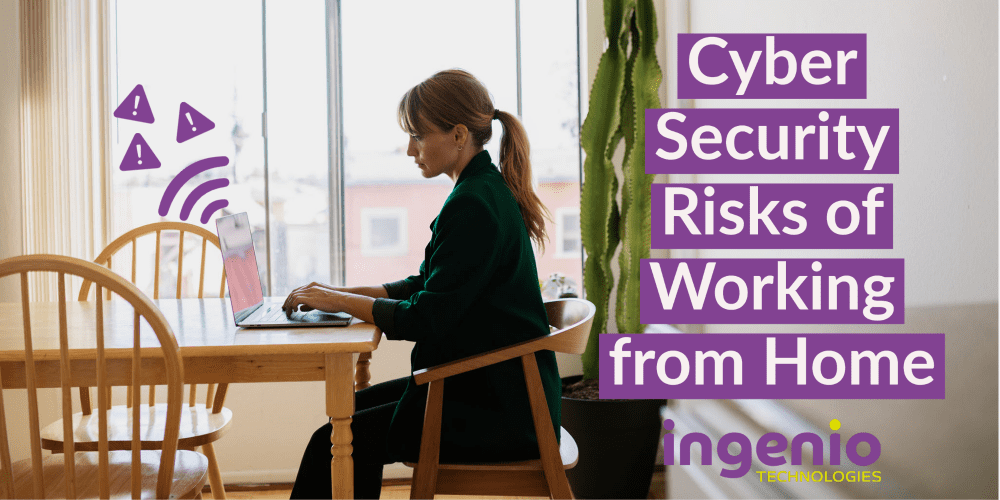Having the option to work from home used to be a luxury, and you would be fortunate if your business gave you this option. However, working from home has become the new normal over the last few years.
How many people in your office are hybrid workers? It can provide a better work/life balance for your employees and provide them with some benefits. To discover what those benefits are, click here.
As with anything, there are also some disadvantages when it comes to hybrid working. One of which is the security risk it poses on your company data and network.
With cyber-attacks on the rise, so are the risks of working from home; persistent hackers are looking to exploit businesses like yours. These criminals are always looking for vulnerabilities to take advantage of; working from home opens up plenty of opportunities for them if you don’t have sufficient protection for your business. Did you know that 66% of UK businesses have been the target of a successful phishing attempt?
We have put together this blog, so you know how to update your business security for those working from home, preventing a data breach, and keeping your business safe. Let’s take a look at what these are:
Risk of Phishing Emails
A majority of hacks are delivered via email Phishing attacks. Phishing attacks often exploit people’s fears and emotions to get them to open an attachment or click links, which will then unleash malicious software onto your device and the businesses’s network. Criminals can then gain access to your computer. Unfortunately, it is becoming increasingly difficult for employees to detect these sophisticated phishing emails.
It is vital to make your employees more aware of phishing emails. This can be done by regularly training your employees on how to help prevent them from falling victim to email scams like phishing. The training should teach them how to spot the signs of these scams so that they know to act swiftly and stop a scam before it starts. An example of what to look out for is flagging an email asking for your password or login information.
Alternatively, it’s worth sending your employees training materials that teach them how to identify and avoid phishing emails can reduce the risk posed by these emails. Again, this should be implemented for both existing and new hires.
Only 52% of organisations in the UK have security training for their employees, although this is higher than the global average of 41%. However, training should be regularly provided. Especially for remote employees, it’s essential to remind them of security risks.
Risk of WiFi
Remote work is becoming increasingly important for businesses because it allows for more flexible work environments. This is especially important for companies that use remote workers because it helps ensure that sensitive corporate data is protected.
Most companies do not consider the security situation of their employees’ personal networks, specifically the employee’s home WiFi network.
We often forget about our WiFi routers when considering security hygiene and our personal devices. Unfortunately, routers that aren’t updated can have security flaws that hackers can exploit and can lead to corporate data breaches over time.
In the same manner, the internet can be used to access confidential and personal information about remote employees, but only if it’s in use.
So, we recommend your employees do the following:
- Update the password on router
The easiest way to protect a home WiFi network is to change the default password. Then change it regularly. The network name (service set identifier or SSID) is one of the most important security considerations when using public WiFi networks. It’s best to make the name anonymous to help keep your personal information safe.
- Avoid sharing company passwords or personal information when working remotely
If you’re worried about cyber-criminals accessing your information, turn on WiFi security so that only approved devices can connect to your network.
- Wired Equivalent Privacy (WEP)
To protect your router, you’ll need to set the security level to something other than WEP.
- Have the latest version of router firmware
Ensure that employees are running the latest version of their router firmware. They should be checking their router settings often to ensure it’s up to date.
- Patches and updates
Patches and updates often improve software security before security problems arise.
Today’s technology makes it possible for employees to work from anywhere, but this doesn’t mean that companies have to put their data, information, and systems at risk.
Following this advice will help reduce the risk of your business getting hacked because one of your employees was working from home. Hybrid working is here to stay, and it’s critical to adapt and stay ahead of cybercriminals.
By understanding the risks of working from a different location and taking the time to put measures in place to prevent them, you will ensure your company data and network is protected.
If your business needs cyber security and you need some advice, get in touch and speak to our security experts today. Call us on 01273 806211 or email [email protected].


